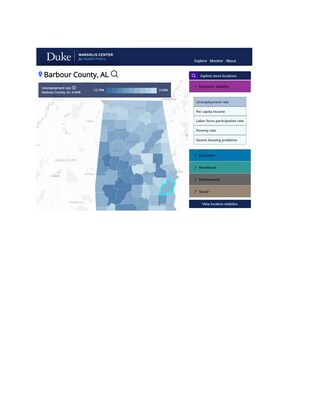TMCnet News
New Tool Aims to Help Local Leaders Curb Opioid Crisis at Community LevelData tool to guide stakeholders in leveraging opioid settlement funds WASHINGTON, May 23, 2023 /PRNewswire/ -- Today, the Duke-Margolis Center for Health Policy and Third Horizon Strategies (THS) launched the Opioid Abatement Needs and Investment (OANI) tool. This interactive resource, developed with support from the Elevance Health Foundation, aims to assist local, municipal and state level leaders working to address the opioid epidemic in their communities. New tool provides geographic-specific info on locales' capacity for opioid treatment and recovery services The tool provides geographic-specific information on the potential need for opioid use disorder (OUD) treatment and recovery services and the locality's capacity to meet that demand. The 1.0 version of the tool uses publicly available data at the county and state level and enables users to investigate a county's potential need for OUD treatment and recovery capacity across the Healthy People 2030 Social Determinant of Health Domains, which includes:
"The goal of this opioid abatement tool is to provide local decision-makers with a resource and guidance to invest opioid settlement funds in efforts and supports that address the addiction needs and challenges unique to their communities," said Dr. Mark McClellan, Director of the Duke-Margolis Center for Health Policy. "Both in the short- and long-term, this resource will help cities and states build and strengthen their social services infrastructure to better combat and treat opioid use disorder comprehensively." While developed as a tool to assess local needs and response capacity, the longer-term goal of this two-year partnership with the Elevance Health Foundation is to help build sustainable recovery-oriented systems of care to curb the opioid crisis beyond the distribution of one-time settlement funds. By using this tool to identify investment opportunities, stakeholders can then start to build components of these systems of care that can be supported through value-based payments. Prior to this tool, limited guidance and resources existed to help local and county officials make informed decisions on how best to invest opioid settlement funds to address the substance use treatment needs in their communities "This new tool will provide local and county officials with additional guidance and resources, helping them make informed decisions within their communities," said Dr. Shantanu Agrawal, Chief Health Officer at Elevance Health. "With millions of Americans struggling with substance use disorder, it's more important than ever to deliver solutions on a local, state, and national level. By acknowledging the physical, behavioral, and social drivers of health as they relate to substance use disorder, this tool will help provide meaningful solutions to achieve better health and advance health equity." The tool, which will be updated automatically as new data for the defined variables become available, was developed based on feedback from opioid experts, policymakers, and settlement fund advocates, and was piloted by a broad range of stakeholders. "Opioid settlement funds provide a profound opportunity for communities to address the harms caused by substance use disorders," said Tym Rourke, Senior Director, Third Horizon Strategies and former Chair of New Hampshire Governor's Commission on Substance Use. "We are excited to have partnered with Duke-Margolis and the Elevance Health Foundation to develop this first-of-its-kind tool offering local, regional, and state-level decision-makers insights into key areas of need and opportunities to have sustainable impact in their communities." Duke-Margolis will monitor the uptake of this tool and capture users' feedback to further refine it. In addition, Duke-Margolis is developing a policymaker playbook that will include practical recommendations and highlight best practices state and local officials can use to address community needs identified using the OANI, as well as use-cases for how value-based payments can be used to achieve sustainability of substance use disorder (SUD) innovations beyond settlement dollars. Duke-Margolis also will develop a measurement toolkit to allow local officials to track progress in patient outcomes and community-level SUD infrastructure development, providing decision-makers and health care stakeholders with specific metrics for evaluating the impact of opioid settlement dollars have on their communities. More information about this work is available here.
About the Duke-Margolis Center for Health Policy About Third Horizon Strategies About Elevance Health Foundation
SOURCE Duke-Margolis Center for Health Policy 
|


